|
 Secure Site
Secure Site
|
 |
Archive for the 'Natural Awakening' Category
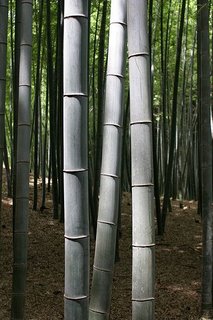 Bamboo trees in Kyoto, Japan Bamboo are a group of perennial evergreen (except for certain temperate species) plants in the true grass family Poaceae, subfamily Bambusoideae, tribe Bambuseae. Giant bamboos are the largest members of the grass family.
Bamboos are also the fastest growing woody plants in the world. They are capable of growing up to 60 centimeters (24 in.) or more per day due to a unique rhizome-dependent system. However, this astounding growth rate is highly dependent on local soil and climatic conditions.
Bamboos are of notable economic and cultural significance in East Asia and South East Asia where they are used extensively in everyday life as building materials, as a food source and as a highly versatile raw product.
adapted from wikipedia.org
 Bamboo Chime Alarm Clock, for a progressive awakening
Now & Zen
1638 Pearl Street
Boulder, CO 80302
Posted in Bamboo Chime Clocks, Japanese Inspired Zen Clocks, Meditation Timers, Meditation Tools, Natural Awakening, Now & Zen Alarm Clocks, Progressive Awakening, Zen Timers
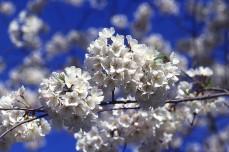 Cherry blossoms (sakura), often simply called blossoms (hana) are a common spring kigo. Kigo is a word or phrase associated with a particular season, used in Japanese poetry.
The association of kigo with a particular season may be obvious, though sometimes it is more subtle. Pumkins (kabocha), for example, are a winter squash that is associated with the autumn harvest.
It may be less obvious why the moon (tsuki) is an autumn kigo, since it is visible year round. In autumn the days become shorter and the nights longer, yet they are still warm enough to stay outside, so one is more likely to notice the moon. Often the night sky will be free of clouds so that also helps with noticing the moon. Autumn is also the time when the full moon can help farmers work under the moonlight to harvest their crops.
adapted from wikipedia.org
 Digital Zen Alarm Clock, a meditation timer and progressive alarm clock
Now & Zen
1638 Pearl Street
Boulder, CO 80302
Posted in Cherry Blossoms, mindfulness practice, Natural Awakening, Now & Zen Alarm Clocks, Zen Timers
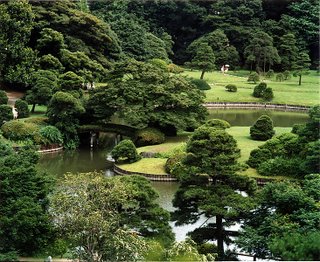 A kaiyu-shiki or strolling garden Chaniwa Gardens are built for holding tea ceremonies. There is usually a tea house where the ceremonies occur, and the styles of both the hut and garden are based on the simple concepts of the sado.
Usually, there are stepping stones leading to the tea house, stone lanterns, and stone basins (tsukubai) where guests purify themselves before a ceremony.
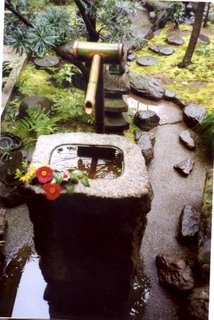 tsukubai Japanese gardens might also fall into one of these styles:
- Kanshoh-style gardens which are viewed from a residence.
- Pond gardens, for viewing from a boat.
- Strolling gardens (kaiyū-shiki), for viewing a sequence of effects from a path which circumnavigates the garden.
adapted from wikipedia.org
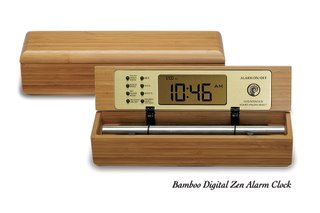 Bamboo yoga and meditation timer
Now & Zen
1638 Pearl Street
Boulder, CO 80302
(800) 779-6383
Posted in Bamboo Chime Clocks, Japanese Inspired Zen Clocks, mindfulness practice, Natural Awakening, Now & Zen Alarm Clocks, Zen Timepiece by Now & Zen, Zen Timers
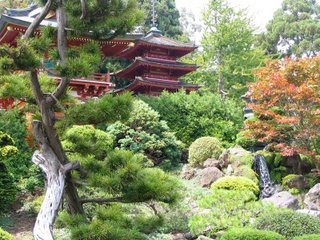 Hagiwara Japanese Tea Garden in San Francisco, California, showing the use of stone, water and plants Tsukiyama Gardens often copy famous landscapes from China or Japan, and they commonly strive to make a smaller garden appear more spacious.
This is accomplished by utilizing shrubs to block views of surrounding buildings, and the garden’s structure usually tries to make onlookers focus on nearby mountains in the distance. By doing this, it seems that the garden has the mountains as part of its grounds. Ponds, streams, hills, stones, trees, flowers, bridges, and paths are also used frequently in this style.
adapted from wikipedia.org
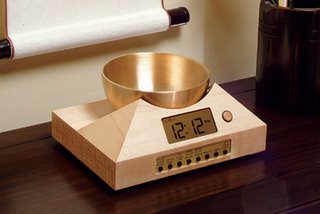 Zen Timer for meditation by Now & Zen Inc.
Now & Zen
1638 Pearl Street
Boulder, CO 80302
(800) 779-6383
Posted in Beauty, Natural Awakening, Now & Zen Alarm Clocks, Progressive Awakening, Zen Gardens, Zen Timepiece by Now & Zen, Zen Timers
 calm the mind, zen timers by Now & Zen, Boulder, CO In Medtitation everyone most likely experiences two of the five hindrances. They are boredom, which is half-hearted action with little or no collectedness and restlessness-worry, which is the inability to calm the mind.
The first three enlightment factors (mindfulness, investigation, energy) are to be used when experiencing boredom to regain collection, the last three enlightment factors (tranquillity, collection, equanimity) are to be used when experiencing restlessness and worry to regain collectedness.
adapted from wikipedia.org
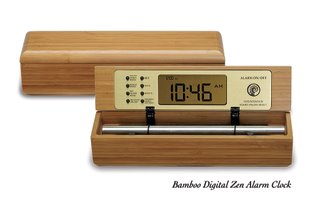 Bamboo Zen Timers, a meditation tool Now & Zen
1638 Pearl Street
Boulder, CO 80302
(800) 779-6383
Posted in Bamboo Chime Clocks, Chime Alarm Clocks, Japanese Inspired Zen Clocks, Meditation Timers, Meditation Tools, mindfulness practice, Natural Awakening, Now & Zen Alarm Clocks, Yoga Timer, Yoga Timers by Now & Zen
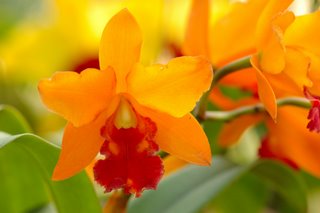 Buddhist Loving Kindness Buddhist loving kindness Mettā or maitrī (sanskrit) has been translated as loving-kindness, friendliness, benevolence, amity, friendship, good will, kindness, love, sympathy, and active interest in others.
It is one of the ten paramitas of the Theravada school of Buddhism, and the first of the four Brahmaviharas. The mettā bhāvanā (“cultivation of mettā”) is a popular form of meditation in Buddhism.
“Loving-kindness” is a term first used in the 1535 Coverdale Bible. The idea is associated with the Christian concept of agape, or love of God, which is reflected in the quote:
“God is inherently kind, naturally compassionate, and everlastingly merciful. And never is it necessary that any influence be brought to bear upon the Father to call forth his loving-kindness.”
Beyond Christianity, English translations of the writings of the Bahá’í Faith also use the term “loving-kindness” when referring to the original Persian “mohabbat”.
Buddhist Loving Kindness adapted from wikipedia.org
Posted in Chime Alarm Clocks, Meditation Timers, Meditation Tools, mindfulness practice, Natural Awakening, Now & Zen Alarm Clocks, prayer, Progressive Awakening, Well-being, Yoga Timer, Yoga Timers by Now & Zen, Zen Timers
a haiku master, Matsuo Basho from Japan
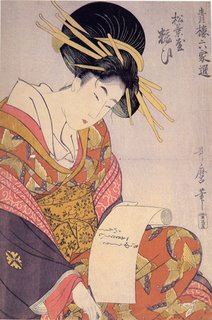 Haiku Ukiyo-e by Kitagawa Utamaro, woodblock print Matsuo Bashō (1644 – 1694) was the most famous poet of the Edo period in Japan. During his lifetime, Bashō was recognized for his works in the collaborative haiku no regata form; today, after centuries of commentary, he is recognized as a master of brief and clear haiku.
Despite his success, Bashō grew dissatisfied and lonely. He began to practice Zen meditation.
“Spring morning marvel
lovely nameless little hill
on a sea of mist”
–haiku by Basho translated by Peter Beilenson
 - Zen Alarm Clock in Maple Finish, Japanese Leaves Dial Face
wikipedia.org
Now & Zen
1638 Pearl St.
Boulder, CO 80302
Posted in Cherry Blossoms, Chime Alarm Clocks, Japanese Inspired Zen Clocks, Japanese Poetry, Meditation Tools, Natural Awakening, Now & Zen Alarm Clocks, Progressive Awakening, Zen Timers
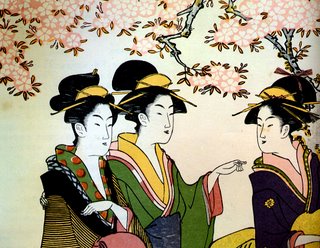 Courtesan Hanaogi of Ogi-ya by Chokosai Eisho, Now & Zen ukiyo-e detail Japanese poets first encountered Chinese Poetry when it was at its peak in the Tang Dynasty. It took them several hundred years to digest the foreign impact, make it a part of their culture and merge it with their literary tradition in their mother tongue, and begin to develop the diversity of their native poetry. For example, in the Tale of Genji both kinds of poetry are frequently mentioned.
A new trend came in the middle of the 19th century. Since then the major forms of Japanese poetry have been tanka (new name for waka), haiku and shi.
In Japan during the ancient times, it was a custom between two writers to exchange waka instead of letters in prose. In particular, it was common between lovers. Soon after in Japan, making and reciting waka became a part of aristocratic culture.
wikipedia.org
 Bamboo Zen Clocks, progressive chime clock and timer Now & Zen Headquarters
1638 Pearl Street
Boulder, CO 80302
(800) 779-6383
Posted in Cherry Blossoms, Japanese Inspired Zen Clocks, Japanese Poetry, Meditation Timers, Meditation Tools, Natural Awakening, Now & Zen Alarm Clocks, Progressive Awakening, Zen Timers
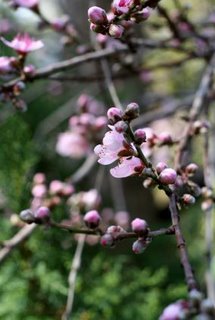 Pink Sakura, Now & Zen Inc. A cherry blossom is the name for the flower of cherry trees known as Sakura in Japanese.
Cherry blossom is an omen of good fortune and is also an emblem of love, affection and represents spring. Cherry blossoms are an enduring metaphor for the fleeting nature of life, and as such are frequently depicted in art.
Cherry blossoms and leaves are edible and both are used as food ingredients in Japan.
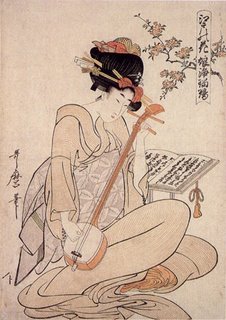 Kitagawa Utamaro Cherry Blossom Flowers of Edo, Now & Zen wikipedia.org
Now & Zen
1638 Pearl St.
Boulder, CO 80302
Posted in Japanese Inspired Zen Clocks, Meditation Timers, Meditation Tools, Natural Awakening, Now & Zen Alarm Clocks, Progressive Awakening, Zen Timers
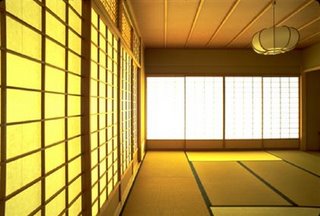 tatami-floored tea room for tea ceremony ...the art of ‘way of tea’ inspired by Japan…
By the 16th century, tea drinking had spread to all levels of society in Japan.
Almost any place where implements for the making and serving of the tea can be set out, and where the host can make the tea in the presence of the seated guest(s), can be used as a venue for tea.
A tatami-floored room with adjacent mizuya space for the host to conduct preparations of the various items to be used is required for a full chaji.
Many schools of Japanese tea ceremony have evolved through the long history of chadō and are active today.
from wikipedia.org
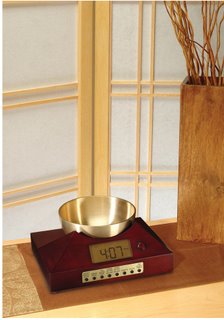 Zen Timepiece, a chime alarm clock and timer in cherry finish Now & Zen Headquarters
1638 Pearl Street
Boulder, CO 80302
(800) 779-6383
Posted in Chime Alarm Clocks, Japanese Inspired Zen Clocks, Meditation Tools, Natural Awakening, Now & Zen Alarm Clocks, Tea Ceremony, wabi-sabi, Zen Timepiece by Now & Zen, Zen Timers
« Previous Page — « Previous Entries
Next Entries » — Next Page »
|
|
|
|